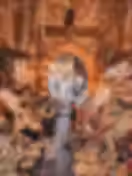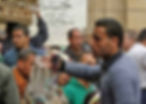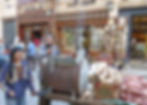Khan El Khalili: An Egyptian Local’s Guide
- Local's Guide To Egypt
- Jun 23, 2025
- 6 min read

Khan El Khalili, the sprawling market/bazaar/souq in the heart of Old Cairo, is a massive hodgepodge of old and new, from beautiful centuries-old Islamic architecture to cheap made-in-China Ramadan lanterns with Mo Salah’s face on them. And while it’s indeed a tourist attraction, most of Khan El Khalili’s patrons are Egyptian locals, so the market is bustling at almost all hours of the day and night, in all seasons.
Now, first things first: before we get into the nitty-gritty, let us just tell you one thing first: Khan el Khalili is *a lot*. Whether it’s a lot in a positive way or a lot in a negative way really depends on the eye of the beholder. It’s crowded, chaotic and loud, which can either be fun or overwhelming, but in most cases, usually a mix of both.
Brief History of Khan El Khalili

In the 14th century, the then-Sultan Barquq’s (his mosque is one of the 10 most beautiful mosques in Egypt) Master of Stables, Jaharkas El Khalili, built a large caravanserai (khan) where Khan El Khalili now stands -- it was essentially a building that housed merchants and their different goods. In later years, other sultans added their own khans/wekalas (another word for caravanserai) until the whole area became a center for trade, both local and foreign, in the late 15th century.
Khan El Khalili today is an integral part of Old Cairo, and the remaining medieval architecture and surrounding areas like Moez Street are reason enough to go (a UN study found that Moez Street has the highest concentration of medieval Islamic architectural treasures in the world). This area, called Historic Cairo, is one of Egypt's seven UNESCO World Heritage Sites.
Read our detailed local's guide to Moez Street here.
You may also like: Cairo's City of the Dead - A Local's Guide
Today’s Khan El Khalili: What to expect

Imagine a labyrinth of tiny alleys stuffed to the brim with shops and vendors peddling all kinds of treasures and all kinds of crap. You’ll find everything from great quality gold and silver jewelry and painstakingly intricate Egyptian handcrafts to plastic bob-headed dogs (who buys those things, anyway?) and everything in between. It’s the best place in Egypt to buy a gift for someone (or, you know, a gift for yourself) and to stock up on kitschy cheap souvenirs for everyone back home in the office.
There are also weekly whirling dervish shows and other cultural/folkloric events.
Getting There

Khan El Khalili is in the heart of Old Islamic Cairo, and you can get there easily by either cab or Uber (expect a lot of traffic in this area though).
Another way of getting there is taking the metro and getting off at the Ataba stop, but then it’s another 20 minutes or so walk from there and not the most pleasant, especially for women, so you’ve been warned.
The easiest, most direct entrance is at the Al-Hussein Square where the Al-Hussein Mosque is, so if you just tell your cab driver to drop you off there or plug it into your Uber destination, you should be able to orient yourself quickly once there.
Buying/Bargaining

If we were to list all the different and sometimes very random things you can buy in Khan el Khalili, we’d be here all night. Suffice to say they have something for everyone, so budget in a couple hours at least to roam around and shop.
Shop owners and other touts will call out to you all sorts of things, including the always popular “How can I take your money today?”. Some are a bit pushy, but if you’re politely firm in your refusal of whatever it is they’re trying to push on you, they’ll keep it moving pretty quickly.
There are also people who roam around trying to sell you trinkets, mugs with names on them (but not yours), henna tattoos, leopard-print lingerie (don’t ask), used books and essentially anything a person can carry around.

In the case of buying anything from either a shop or a roaming trinket hawker, feel free to bargain. If bargaining isn’t your sharpest skill, then just think of what amount of money you feel you would be ok spending on whatever you’re negotiating over and stick to that. Also don’t be afraid to turn around and leave if the price they’re asking for is too much -- they sometimes try to guilt you into paying their price by quickly wrapping up the item as if you already bought it even before you settle on a price. If you ever feel like the shopkeeper is being too pushy, then just leave. Don’t let anyone intimidate you into buying something you don’t want.
Types of people you’ll find there

Besides the vendors and shopkeepers, you’ll also find random ‘performers’, and we’re using the term loosely. From loud (very loud) singers to tabla drummers, these energetic people wander the alleys and will unabashedly ask for a ‘tip’ from anyone who seems to be enjoying their performance.
Sadly, a fact of life in Egypt is that you’ll see beggars, including children, and Khan El Khalili is no different.
Roaming food vendors -- we like these guys. Indulge in some Egyptian street snacks like roasted peanuts, baked sweet potatoes or termes (lupin beans) while you shop.

Egyptian locals. While this might seem a bit ‘duh’, for the many visitors to Cairo who spend most of their time at tourists spots and their hotels, this is one of the few times that you can really immerse yourself with Egyptian locals. Most locals in Khan El Khalili are busy going about buying this-and-that from so-and-so, herding their kids through the crowds, negotiating prices in booming voices, or laughing, talking and smoking (probably a combination of the three) in one of the various cafes.
Just random fun weirdos. People-watching in Khan El Khalili is a cross between the circus, New York City, and 1001 Arabian Nights.
Cafes and Restaurants

Khan El Khalili has quite a few restaurants and cafes, but don’t bother looking for anything that looks familiar -- the fare here is decidedly Egyptian.
Khan El Khalili Restaurant & Naguib Mahfouz Cafe (or just Naguib Mahfouz Cafe for short) is the most famous restaurant and cafe in the market due to its being run by the Oberoi hotel group -- they have consistently good food and swankier surroundings then most other restaurants in the area. On weekends and other high traffic times there might be a wait though, and it’s pricier than other cafes in Khan El Khalili. For more restaurants in Cairo recommended for both tourists and locals alike, head here.
El Fishawy is another extremely famous cafe, due to its being open for more than 200 years. Expect to be squeezed into any open chair they have in the alley, even if you end up sharing a table with a stranger, because this place gets crowded, fast. Stop here for a shisha or a quick drink, and we do mean quick, because the waiters will try to hustle you out as soon as you’re finished drinking. A good spot for people watching. Read: Vintage Cairo - 17 of the Oldest Restaurants, Cafes & Bars in the City

In the outer square, overlooking Al-Hussein mosque, you’ll find a bunch more restaurants and cafes. Local tip: if you’re a meat lover, try the kebab and kofta from El Dahhan, followed by rice pudding for dessert at El Malky. Do not and we repeat ~do not~ expect anything fancy -- if chaos and questionable hygiene standards put a damper on your appetite, then maybe stick to Naguib Mahfouz cafe (or skip eating in Khan El Khalili in general).
Safety

The good news is, Khan El Khalili is a lot of bark and no bite -- meaning, it looks crowded and chaotic (and is), but there is very little actual danger posed to tourists.
Just use normal common sense and keep your bags close and money/valuables zipped somewhere safe. There are also touristic police (both in uniform and in plain clothes) roaming the alleys at all hours, so if for any reason you run into any trouble, just head in their direction.
Leaving

Leaving is as straightforward as arriving -- head to the main square next to Al-Hussein mosque, where you’ll find one big entrance/exit. There are a bunch of cabs there (be sure to either agree on a price before you hop in, or make sure the meter is running) and it’s also an easy location for an Uber to pick you up from.
You might also like:
Happy shopping!